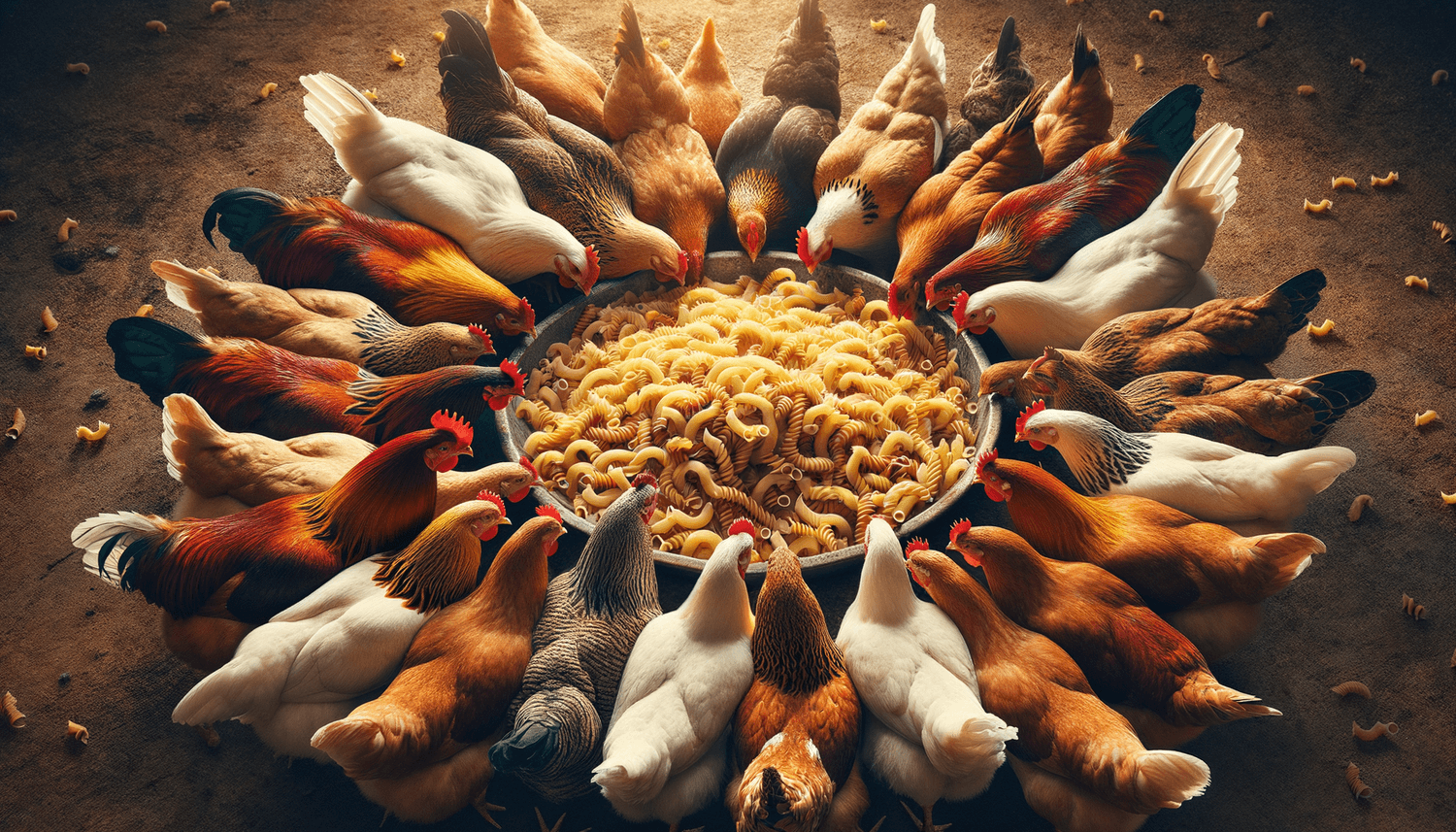Who doesn’t love a hearty bowl of pasta? It’s warm, comforting, and oh so satisfying! But when it comes to our feathered friends in the backyard, we might wonder if we can share this delicious dish with them. In this fun and informative blog post, we’ll dive deep into the world of chickens and pasta, exploring whether or not they can enjoy this Italian classic. Along the way, we’ll look at the importance of a balanced diet for our clucking companions, discuss the nutritional value of pasta, and figure out how to properly prepare it for our favorite egg-laying crew. So, let’s get this pasta party started, shall we?
Can chickens eat pasta?
Yes, chickens can eat pasta, and it is generally safe for them in moderation. Keep in mind, though, that it should not be a substitute for a balanced and nutritious diet. While cooked, plain pasta can be a fun treat for your chickens, always ensure they receive the essential nutrients from their regular feed and other healthy sources to maintain optimal health.
A balanced diet for clucky companions
Just like humans, chickens need a balanced diet to thrive and maintain their health. While it’s tempting to spoil them with treats, it’s crucial to remember that their primary source of nutrition should come from a high-quality chicken feed. Chicken feed is specially formulated to provide all the essential nutrients, vitamins, and minerals your chickens need to function optimally.
A chicken’s diet should consist of around 80-90% high-quality chicken feed to ensure they receive the necessary nutrients for a strong immune system, healthy feathers, and excellent egg production. The remaining 10-20% of their diet can include treats like fruits, vegetables, and even pasta in moderation. These treats not only provide your chickens with a fun and exciting diet variety, but they can also supplement their primary diet with additional nutrients. Just remember not to go overboard with treats and always prioritize balanced chicken feed for your flock’s well-being.
Nutritional value of pasta for chickens.
Feeding pasta to chickens can provide some nutritional value, though it’s important to remember it should only be given as a treat and not a primary food source. Pasta is a good source of carbohydrates, which can provide energy for your chickens. It also contains some protein, albeit in smaller amounts than their regular chicken feed.
However, pasta lacks the necessary vitamins, minerals, and other nutrients that are essential to a chicken’s overall health. Some of these important nutrients include calcium, phosphorus, sodium, and essential amino acids. These are primarily found in their chicken feed, along with a broader range of other necessary vitamins and minerals. Thus, while pasta can be a fun treat and provide a small nutritional boost, it should not be relied upon as a primary source of nutrients for chickens.
Hydration is yet another consideration when it comes to feeding your chickens pasta. As pasta requires cooking, it may contain a fair amount of water, which can help meet your flock’s hydration needs. However, always ensure your chickens have access to fresh water since water content in pasta will not be sufficient to meet their daily requirements, especially during hot weather conditions when they need ample hydration to combat heat stress.
Nutrition table of pasta for chickens.
| Information | Description |
|---|---|
| Nutritional Value | Pasta provides carbohydrates and some protein, but lacks essential vitamins and minerals. |
| Suggested Serving Size | Small amounts as occasional treats, making up no more than 10-20% of their diet. |
| Safe Feeding Practices | Offer cooked, plain pasta without any sauces, spices, or additives. |
| Preparation | Cook pasta thoroughly, then allow it to cool before serving to chickens. |
| Potential Risks | Overfeeding pasta can lead to nutritional imbalances and obesity in chickens. |
| Hydration | Pasta may provide some additional water content; however, fresh water supply is essential. |
| Digestion | Chickens can digest pasta without issues, as long as it is not their primary food source. |
| Seasonal Availability | Pasta is a non-seasonal food item that can be fed to chickens year-round. |
| Other Benefits | Feeding pasta can create variety in the diet and promote mental stimulation for chickens. |
Alternatives to pasta for chicken treats
If you’re looking for healthier treat options for your chickens, consider providing them with fruits, vegetables, and other protein sources that are rich in valuable nutrients. Examples of healthful treats include leafy greens, berries, melons, peas, carrots, and mealworms. These can supplement your chickens’ balanced diet and offer a more significant nutritional impact compared to pasta.
Can chickens eat other types of pasta?
If you’re wondering whether your chickens can eat other types of pasta, such as whole grain or gluten-free varieties, the same principles apply. It’s essential to cook, cool, and serve these pasta types plain, without sauces or additives. While whole grain pasta may offer slightly more nutritional value than regular pasta, it should still be offered only as an occasional treat and in moderation to ensure your chickens maintain a healthy, balanced diet.
Final thoughts on feeding pasta to chickens
Feeding pasta to your chickens can be a fun treat that adds variety to their diet, but it’s important to remember that moderation is the key. Always ensure that your chickens receive the majority of their nutritional requirements from high-quality chicken feed and prioritize a well-balanced diet over treats. Serve pasta in moderate amounts to maintain your flock’s health and well-being, while also offering them more nutrient-packed treat options to vary their diet and keep them happily pecking away.

















